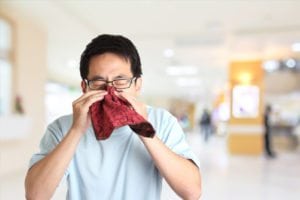How far does your sneeze travel?
If you forget to cover your mouth or nose during just one sneeze or a little cough, it’s not a big deal, right? That might be what you tell yourself when your child sneezes right in your face, or when someone standing behind you in the checkout line coughs and doesn’t cover their mouth.
Unfortunately, germs fly out of your nose or mouth and travel much farther than you might think.
“Sneeze and cough germs spread far and fast,” explained Dr. Stephanie Kelleher, a Geisinger family physician. “These tiny droplets float through the air and you can get a cold, the flu or another illness when you come into contact with them.”
A recent study from the Massachusetts Institute of Technology noted that germs from one sneeze could travel from 19 to 26 feet. What’s also unfortunate is how fast these germs travel: A sneeze can move 100 miles per hour, which makes getting away from someone when they sneeze just about impossible.
That’s why, as children return to school and we prepare for flu season in a few short weeks, it’s important to review the best way to prevent the spread of germs.
Wash your hands
“The most important way to prevent the spread of germs it by washing your hands,” said Dr. Kelleher. “This tried-and-true technique is still the best way.”
To wash your hands properly, use warm water and soap. Lather for 20 seconds—roughly the amount of time it takes to sing the “Happy Birthday” song. If soap and water aren’t available, you can use hand sanitizer with at least 60 percent alcohol. However, know that hand sanitizer doesn’t kill all germs.
Cover your mouth and nose
When you feel that tingling sensation in your nose or you need the relief of a cough, cover your nose and mouth with a tissue. If there isn’t a tissue available, trying coughing or sneezing into the crook of your elbow. This will prevent some germs from flying and keep your hands clean.
“We used to cover our nose and mouth with our hands but that’s not doing much to stop germs from spreading unless you immediately wash them as soon as you cough or sneeze,” said Dr. Kelleher. “Practice this new method if you can’t grab a tissue quickly. Teach your kids, too.”
Don’t touch your face, eyes or mouth
Many people touch their faces, rub their eyes or touch their mouths throughout the day without even knowing it. But if you’ve got germs on your hands and you touch these parts of your face, you could spread germs to the mucous membranes of your eyes, nostrils or mouth and get sick.
Instead, make a mental note to stop touching your face, eyes and mouth if you’re not feeling well. Washing your hands also reduces the likelihood that you’ll spread germs this way.
Get a flu shot
Flu season doesn’t start for a few weeks, but we can’t say it enough: Get a flu shot to prevent getting sick. It takes about two weeks to become effective, so earlier is better.
Stay home when you’re sick
Keep your distance if you’re not feeling well. Just as we’ve discussed, sneeze and cough germs travel far. If you’ll be doing a lot of either of those, stay at home until you are well. Keeping your distance from family members while you’re at home can also help stop the spread of germs.
“Getting a bit of a cold or the flu might not be an issue for you, but you should be mindful of the people around you,” said Dr. Kelleher. “If someone has a weakened immune system, a cold or the flu can make them much sicker than most people.”
Stephanie Kelleher, DO, is a primary care physician at Geisinger South Wilkes-Barre. To schedule an appointment with Dr. Kelleher or another primary care physician, please call 570-808-8780 or visit Geisinger.org.





